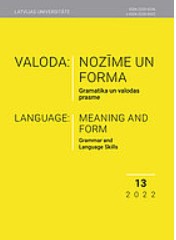Modālie darbības vārdi Ērģemes izloksnē
Modal verbs in the subdialect of Ērģeme
Author(s): Anete DainaSubject(s): Phonetics / Phonology, Morphology, Baltic Languages
Published by: Latvijas Universitātes Akadēmiskais apgāds
Keywords: modality; modal verbs; possibility; necessity; Ērģeme subdialect;
Summary/Abstract: The subdialect of Ērģeme is a part of the Vidzeme Central subdialects of the Central dialect of the Latvian language and it is one of the most studied Latvian subdialects in terms of phonetics, morphology and vocabulary, while less so regarding its particularities within the usage of modal verbs. This article provides an insight into the matter, and analyses the use of modal verbs varēt ‘can, may’, drīkstēt ‘to be allowed, may’, gribēt ‘to want’, vajadzēt ‘to need’ from the aspect of epistemic modality and deontic modality and their modal meanings, but also considering their phonetic and grammatical features. The aforementioned modal verbs are analysed in the construction together with infinitive, although they can also be used as independent verbs and function as predicates. While analysing modal verbs, their negation has to be taken into account, too. The article focuses on the negated modal verbs, and excludes the negated infinitive modified by them. The sub-dialect language material used for analysis of modal verbs dates back to the middle of the 20th century. The author of this article has previously studied modality and modal verbs among other means of expressing modality in Latvian in different discourses (e. g., internet comments, mass media, language corpuses, presidential speeches). The subdialect of Ērģeme as a source of research has been chosen in order to gain multi-sided insight into the use of modal verbs in Latvian. In addition, the subdialect of Ērģeme has been already explored by the author from other perspectives.
Journal: Valoda: nozīme un forma
- Issue Year: 2022
- Issue No: 13
- Page Range: 64-77
- Page Count: 14
- Language: Latvian

